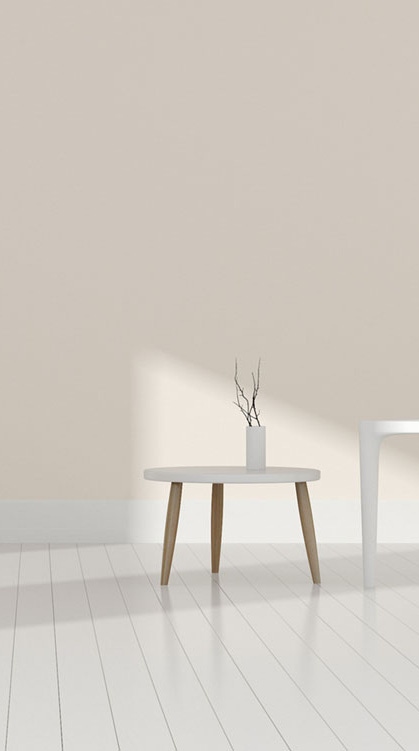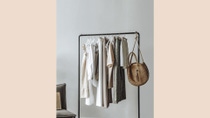„Studies show a generally positive relationship between minimalism and well-being.“
Professor Joshua Hook
University of North Texas, United States

Media
Minimalists – aren’t they the ones with white, empty rooms? Yes and no. In addition to being a design style, voluntary simplicity is a social movement and a guide to sustainable, conscious consumption. Our author endeavors to find out how much is enough.
Even though my new apartment looks only semi-minimalist, I have gained a lot by holding a packing party to do my clear-out and thinking hard about which things I really need.
My journey toward minimalism and more sustainability begins with a move within the German city of Cologne and the realization that I am a hunter-gatherer – just like so many people in affluent societies. According to the L.A. Times, an average U.S. household owns around 300,000 items, and the Neue Zürcher Zeitung estimates that each European hoards about 10,000 objects – numbers that supporters of a minimalist lifestyle like to cite as a deterrent, although there is no actual evidence for them. I start counting what I have in my home, but soon give up – I can’t keep up with the unofficial competition among minimalists on the internet to get down to the magic figure of 100 anyway.
In cow-sharing, the meat ofa cow is divided up completely among various buyers. It is not slaughtered until the whole animal has been sold, so that no meat is wasted. An age-old principle has thus reached the start-up era.
“Less is more” is their credo, which also embraces the idea of a more sustainable lifestyle. Sounds good at first, but what does it actually look like? When I search the term “minimalism” on the internet, I find thousands of images of airy, empty, immaculate white rooms. I also come across “The Minimalists” – real names Joshua Fields Millburn and Ryan Nicodemus – who are trying to help millions of people to lead more meaningful lives with fewer possessions. The two Americans spread their message by all available channels – they blog, make podcasts, write books, and deliver enthusiastic speeches.
The capsule wardrobe consists of basics that can be combined in a wide variety of ways. One approach to what this can look like is presented by slow-fashion blogger Candice M. Tay at #capsuleconversations. If you are unsure about color combinations, you can follow the example of former U.S. President Barack Obama and rely on just two colors – in his case, dark blue and grey.
What does science say about the trend toward minimalism? Where does the desire for voluntary simplicity actually come from? I put these questions to Joshua Hook, Professor of Psychology at the University of North Texas, United States. He has conducted a review study examining the relationship between minimalism, voluntary simplicity, and well-being. A few hours later, I receive his response: “At least here in the States, there is often an urge to have more – more money, bigger houses, and so on. But I have the impression that this urge often feels empty,” the psychology professor writes. This is also true in Cologne, I think.
Too many things, too many commitments, too much information. During the pandemic, many people in affluent societies realized how many things in their lives were “too much,” and the lockdown marked the start of the great clear-out. For some, this was a way of passing the time, for others it was necessity – they needed more space because suddenly all family members were constantly at home. It strikes me that this lockdown minimalism is merely the reaction to a problem.
Video call to Richard Watson, author, lecturer, and futurist-in-residence at the Cambridge Judge Business School, England. I reach him in his summer house. “All sorts of stuff in here, as you can see,” Watson, born in 1961, calls cheerfully to the camera. For him, the movement from more to less is “definitely a trend for people in prosperous industrialized nations, for a rather young and urban target group.” They are a minority. The countertrend is known as maximalism. “The accumulation of objects as a status symbol is particularly noticeable in emerging markets,” he says. And not only there. In rich countries, too, many people simply want to be able to treat themselves. Although car-sharing rates in Germany, for example, continued to rise significantly in 2021, one in four new registrations was for a gas-guzzling SUV.
Using furniture without owning it: IKEA has been doing this since 2021 in Spain and Poland, for example. In those countries, the Swedish company is trialing a furniture subscription model for corporate customers, repairing and maintaining furniture so that it can be reused as often as possible. This furniture service will soon also be available to private customers.
„Studies show a generally positive relationship between minimalism and well-being.“
Professor Joshua Hook
University of North Texas, United States
For the minimalists Millburn and Nicodemus, the “less is more” lifestyle is paying off. As they put it, not only have they changed their own lives for the better, but also their followers write posts reporting feelings of happiness, greater satisfaction, and better personal relationships. These are big promises, but there is not yet much evidence of all this in Cologne. What does science say? I ask Professor Hook in Denton, Texas and receive a prompt reply: The studies examined reveal “a generally positive relationship between minimalism and well-being.” However, he points out that almost all the studies were correlative. In other words, just because there is a strong connection, that does not mean there is a clear cause-and-effect relationship. “For this reason, we cannot say with certainty that minimalism boosts well-being – merely that there is a positive connection between them,” the academic adds, announcing further research on the subject. I shall probably have to be patient, so I start an experiment on myself.
Are you a digital junkie, constantly pulling out your smartphone to take photos and post and like things? Pay attention to these tips from U.S. bestselling author Cal Newport: Leave your smartphone at home. Do not dish out likes or write comments on social media. Open your messaging apps only twice a day, at specific times. Also, consider first how to make meaningful use of the time you are going to save.
It is time for a practical test and a packing party in the style of “The Minimalists.” It works like this: You act like you are planning to move house, and pack all your belongings in moving boxes, label everything neatly, and then unpack only those things that you absolutely need. For everything else, the rule is: donate, sell or recycle. However, the minimalists recommend that action should be preceded by reflection. I can only answer the question “What should my apartment look like?” when I know what my life should look like. I was not at all prepared for such deep questions, but never mind. In my case, the answer is: less material ballast and more time for trips into nature.
As I pack for my real move, I first make quick progress, because at first I pack only things that I will immediately need in the new apartment: a pot, plates, a towel and similar essentials. Then it gets tough. The drawers are full of yellowed concert tickets, the closet is piled high with T-shirts, and in the kitchen cupboards I discover as many as six opened packets of paprika. I decide not even to think about the cellar for the time being.
Then, while I’m still in the process of thoroughly sorting and disposing,
I suddenly reach for my smartphone and procrastinate. While I scroll through social media, ads are constantly popping up for products that make use of the motto of minimalism. The search for minimalists and their ideas have clearly encouraged my algorithms to intervene in my decluttering and to keep making purchase recommendations.
The less-is-more principle has obviously penetrated the product world. Watson answers the question of whether companies, too, can pursue a minimalist philosophy with a clear “Yes,” and cites the example of Muji. This Japanese company enjoys global success with its functionally created products and their minimalistic design. It now also offers micro houses. Tiny houses as a product range are something I’ve already come across in my home region of North Rhine-Westphalia, where the Containerwerk company gives a second lease of life to decommissioned shipping containers – offering high-quality living conditions in a small space.
The Containerwerk company gives a second lease of life to decommissioned shipping containers as minimalistic, high-quality and affordable living-space modules. To make them energy-efficient and safe – especially from fire – a form of insulation that has now been patented was developed, using Elastopor®, a polyurethane foam from BASF. The thin insulating layer saves space and complies with relevant energy-efficiency regulations. From this spring, the minimalistic modules will also be used for sustainable hotels.
The idea of minimalism is linked not only to the tiny house movement but also to the mega-issue of sustainability, Watson believes. As these mini houses do not have much space, you have to limit yourself to the essentials. In addition, it is usually true to say that the less living space a person occupies, the lower their CO2 emissions will be.
„It is more important to have access to things than to own them, and if you share, you save resources.“
Richard Watson
Futurist-in-Residence, Cambridge Judge Business School, England
“You’ll own nothing and be happy,” it says in the video “Eight predictions for the world in 2030,” which was produced for the 2017 World Economic Forum. I am a long way from that, I think, as I throw the concert tickets into my paper waste. The quotation comes from Danish member of parliament Ida Auken, who foresees a future of sharing. Watson similarly says that, when it comes to sustainability, minimalism and the sharing culture could and should come together. “It is more important to have access to something than to own it, and if you share things, you consume fewer resources,” he says. Especially for young people, Watson says, it is normal to borrow what you need as you need it.
My conclusion about minimalism: Even though my new apartment looks only semi-minimalist, I have gained a lot by holding a packing party to do my clear-out and thinking hard about which things I really need. However, I am still miles away from the target of 100 items. Meanwhile, I am consoled by Millburn and Nicodemus. In their words, it is not about “owning as little as possible, but simply owning the right things – and what is right is something that each person has to find out for themselves.”
Desperately seeking a room? The “home in return for help” approach could be the answer. The elderly or families receive help in the home and share their apartment, which students, for example, can use cheaply in return.
I decide to continue working on myself and my non-ownership, and I am eager to see whether the minimalism movement will endure. Futurist Watson in Cambridge, anyhow, is frowning in front of his laptop and issuing a warning in view of an impending global recession: “I really hope minimalism will continue, but if the economy collapses, that trend might disappear out of the window!” This is because, if you suddenly have to rein yourself in as a result of economic necessity, a lifestyle of deliberately chosen frugality will not work for you anymore. Psychologist Joshua Hook in northern Texas is more optimistic about it: “If individuals become aware of the positive impact of minimalism, I believe that this trend is definitely sustainable,” he says.





